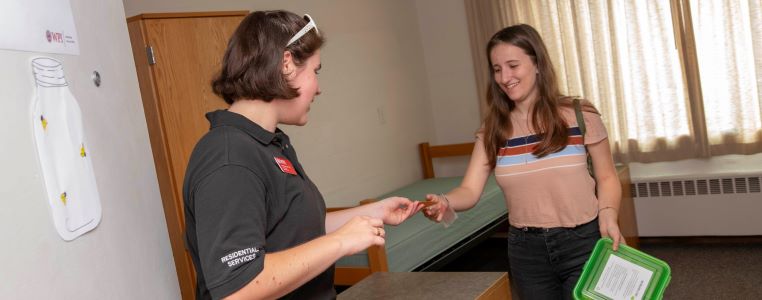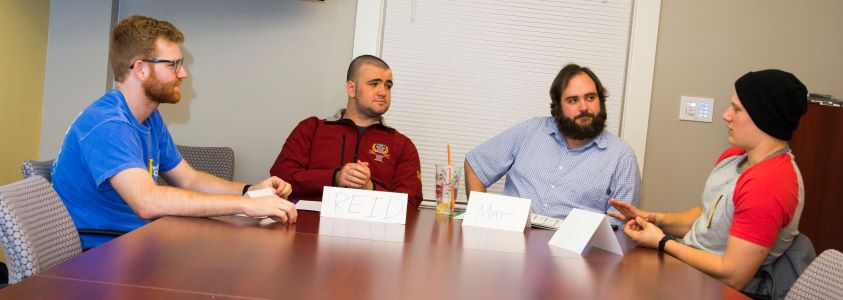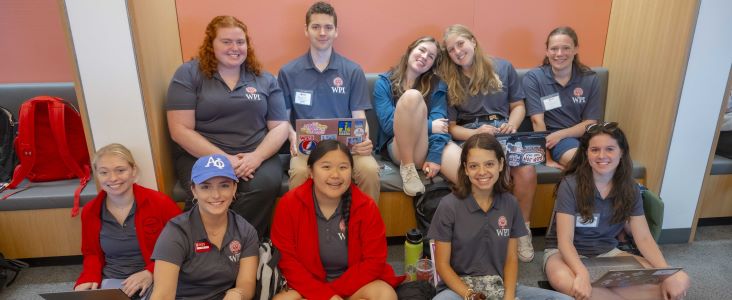Peer Leadership
There are a variety of programs, initiatives, and services to enhance and develop your leadership skills at WPI. Leadership opportunities include everything from getting involved in student government or a student organization; supporting your peers as a tutor or resident advisor; educating fellow students about important health and wellness issues; and collaborating with industry leaders to hone your networking skills. WPI student leaders make a positive impact on the campus community while also gaining valuable, real-world experience.
However you decide to discover leadership at WPI, there’s a program here for you.
Community Advisors

Community Advisors (CAs) are some of the first leaders new WPI students interact with, and often have a lasting impact on students as they transition from high school to college life. CAs work in conjunction with Resident Assistants and Insight Advisors to help new undergraduate students acclimate to life at WPI. This paid opportunity begins during New Student Orientation in August and runs through A and B term of the next academic year.
Graduate Student Government

Devoted entirely to graduate students, members of the Graduate Student Government (GSG) collectively act as the graduate student voice to communicate with faculty and administration and provide academic and social activities for graduate students. Find out more about WPI's Graduate Student Government.
Resident Advisors

Resident Advisors (RAs) play a pivotal role in helping new undergraduate students adjust to living on campus. Responsible for the safety and well-being of residents in a particular section or floor of a residence hall, RAs are chosen based on leadership skills, enthusiasm, organizational skills, maturity, and a willingness to help others. In addition, RAs are compensated by receiving a free room and discounted meal plan. Interested in learning more? Email Residential Services for more information.
Residence Hall Council

Run by students, for students, the Residence Hall Association (RHA) is made up of residential students who strive to improve the on-campus experience through programming and advocacy. RHA has an executive council made up of elected students who oversee all of the functions of the organization. RHA has weekly meetings that are open to all residents and various opportunities such as committees and programs for residents to get involved in to shape the residential experience. As part of the RHA, you’ll learn to plan events, work in groups, and develop invaluable leadership skills. Learn more.
Student Government Association

Members of the Student Government Association (SGA) work together to improve the quality of undergraduate student life at WPI, both academically and socially. Tasks include addressing student needs and concerns, providing financial structures for student clubs and organizations, and representing the student body in a professional manner. Check out our website for more information.
Peer Support

Whether helping a friend work through a crisis or educating your peers about drugs and alcohol, there are countless ways for you to put your leadership skills to the test while also helping to make your peers aware of important issues around them. Explore peer support and training opportunities through the Student Development and Counseling Center.
Summer Transition Assistants

The Summer Transition Assistant is a student leader who provides peer-level support to new students before they arrive on campus for New Student Orientation. They connect regularly with students throughout the summer, offering resources and guidance to ensure a smooth transition to college life.
MyWPI
MyWPI is the all-in-one campus experience management platform used to help students, staff, and faculty connect, collaborate and be successful.
Leadership Recognition
WPI presents the Emerging Leader of the Year, Peer Learning Assistant of the Year, Crimson and Gray, and CARE Awards to outstanding student leaders who have demonstrated exceptional leadership qualities through involvement in organizations, within the WPI community, and with peers.